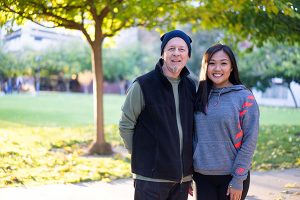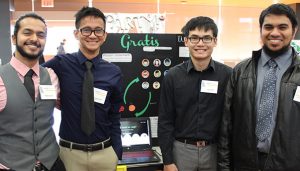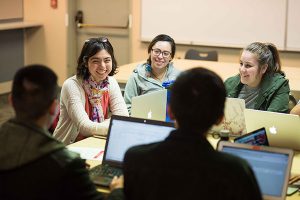
Laura Cayabyab, ’17 Sociology, right, served as president of student organization COOP SJSU and poses for a photo with the group’s faculty advisor Michael Fallon.(Photo: James Tensuan, ’15 Journalism)
By David Goll
Like many students graduating in the Bay Area, housing concerns have often been on the mind of Laura Cayabyab, ’17 Sociology. While she said her parents have a home in Silicon Valley in which she is welcome, her greatest academic and personal passion has been to find solutions for the growing dilemma of homelessness in one of the nation’s most expensive housing market.
A December graduate, Cayabyab turned her concerns into action, serving as president of COOP SJSU for the past year. The student organization addresses pressing social issues on campus and the greater San Jose community. She and fellow COOP officials, including Ryan Eckford, have spearheaded drives on campus to collect clothing and hygiene items to distribute to the homeless.
“I’ve talked to a lot of people, many fellow students, about their housing situation,”Cayabyab said. “For those who don’t have parents who live around here, I would say nine out of 10 have told me they will be looking for work outside the Bay Area. Even for people with technical degrees, they often can only get contract work with high-tech Silicon Valley companies.”
Cayabyab said a 2016 study revealed about 300 of SJSU’s 33,000 students are homeless—the definition includes students who live in cars, on the streets or who “couch surf”. The number of homeless people in San Jose on any given night is estimated at 5,000. The Bay Area’s largest city has among the highest rents in the nation—according to website Rent Jungle, the average monthly cost for a one-bedroom apartment in San Jose in November was $2,430.
As one of her last official acts as president of the student organization, Cayabyab and Eckford helped organize and lead a discussion on the region’s housing crisis last month at an On The Table event, sponsored by the Silicon Valley Community Foundation (SVCF). The nonprofit organization is the world’s largest philanthropic community foundation, with $8 billion in assets under management. Two dozen students, staff, faculty and lecturers attended, along with representatives of the City of San Jose and Santa Clara County.
Cayabyab and Eckford also received assistance in organizing the event from Carol Stephenson of People Acting in Community Together (PACT), a multi-faith, multi-ethnic grassroots social justice organization.
“We asked people who attended to think about housing instability in the Bay Area,” the recent graduate said. “How it affects them and others in their lives, what are the good things about housing in the Bay Area, but also how we can make it much better.”
About a week later, the COOP students attended another On The Table event at the foundation’s Mountain View headquarters. Leaders of community organizations from throughout the Bay Area attended.
“It was really interesting to see people from throughout the region talk about the programs they’ve had to improve housing instability for years,” Cayabyab said. “It’s interesting to hear what keeps them going.”
Michael Fallon, who retired as adjunct professor of sociology at SJSU in June, has been involved in the COOP organization at the faculty level in recent years. He said the group was founded to address pressing social issues in Silicon Valley, primarily focused on housing the homeless.
Fallon also served as Director of the Center for Community Learning and Leadership at SJSU, which has focused its efforts on cleaning up the pollution of Coyote Creek as a result of the former homeless encampment of several hundred people that was closed down three years ago. Known as the Jungle, the infamous camp became a symbol of the haves and have-nots in Silicon Valley.
Fallon said he has been happy to be a catalyst himself in sparking social awareness and the ability to devise practical solutions to seemingly intractable societal ills.
“I am an educator, first and foremost,” he said. “I educate students in how to address critical social issues and hope my students will engage with the community and participate in the solutions.”


